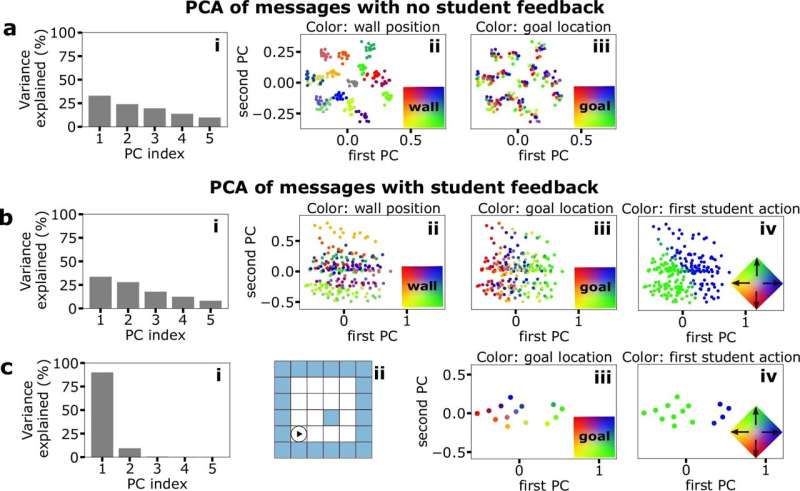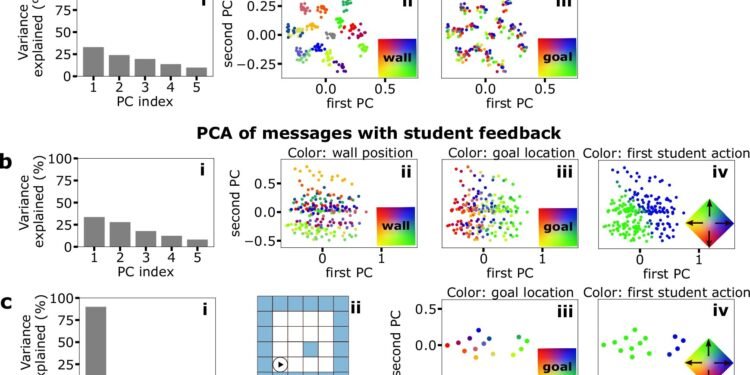
Across all species, critical skills are passed on from parents to offspring through communication. Researchers at the University Hospital Bonn (UKB) and the Researchers at the University of Bonn showed that effective communication relies on how both the sender and receiver represent information. Their study reveals how this process underlies training efficacy and task performance. Their results have been published in the journal Nature Communications.
Communication—be it through sounds, smells or movements—is crucial for survival. Its social aspect is fundamental to cognition, as our task descriptions in the brain are shaped not only by sensory experiences, but also by the information communicated to us.
“We know from our everyday lives that social communication is essential to our learning abilities in the real world, which is summed up by the saying ‘teaching is learning for the second time,” says Prof. Tatjana Tchumatchenko, from the Institute of Experimental Epileptology and Cognition Research at the UKB and member of the Transdisciplinary Research Area (TRA) “Modelling” at the University of Bonn.
In a novel study, the Bonn researchers used artificial networks as agents that took on the roles of teachers and students. The teacher network learned to solve a maze and then guided the student network through the task by transmitting a message. This setup allowed the researchers to investigate how language-like communication between artificial agents improves learning and task performance.
The brain creates abstractions for our real world to be shared
The results showed that both roles can develop a language that enables the student to learn from the teacher. Interestingly, this language was influenced by both the task at hand and the learner’s performance.
“What we found is consistent with what is known about language formation in animals,” says Carlos Wert-Carvajal, co-corresponding author and Ph.D. student at the University of Bonn in Prof. Tchumatchenko’s research group at the UKB. He emphasizes that the way our brain encodes our world is not only determined by our own experiences but also creates abstractions that are understandable to others:
“For example, we don’t say ‘sweet, crunchy, round red or green fruit,’ but use the single word ‘apple.’ Such a word exists because our language has evolved to represent a shared experience that provides a pleasant reward,” say Wert-Carvajal. In other words, every language must describe the world as efficiently as possible.
This efficiency meant a concise message that contained as much information as possible. Good language had to combine both the teacher’s and trainee’s internal descriptions of the task and the actual characteristics of the real world.
“When we gave feedback on how well the trainee did the task, the teacher changed his language to convey more useful information,” explains first author Tobias Wieczorek, who until recently was a master’s student at the University of Bonn in the Tchumatchenko group at UKB.
This process shows that effective communication is a two-way process. “Both the sender and the receiver must work together to ensure that the information exchanged is clear, precise, and truly useful,” says Prof. Tchumatchenko, who led the study.
Language closes the circle in communication as a shared experience
Remarkably, by “closing the loop”—that is, by feeding the language of the learner back to itself—the Bonn researchers were able to enable learners to teach each other. Despite lacking explicit teaching skills, the agents effectively communicated essential information and demonstrated the robustness of the language they had developed.
“Although they did not know how to ‘teach’, they were still able to use their language to convey important information,” says co-corresponding author Dr. Maximilian Eggl, who until recently was a postdoc at the University of Bonn in Prof. Tchumatchenko’s research group at UKB.
This research highlights the fundamental role of language-like communication as a shared cognitive experience and demonstrates its critical importance for learning and generalization. The results provide valuable insights into the design of biological and artificial communication systems that optimize learning and task performance in different environments.
More information:
Tobias J. Wieczorek et al, A framework for the emergence and analysis of language in social learning agents, Nature Communications (2024). DOI: 10.1038/s41467-024-51887-5
University Hospital Bonn
Citation:
Language-like communication improves learning in artificial networks, finds study (2024, September 5)
retrieved 5 September 2024
from https://techxplore.com/news/2024-09-language-communication-artificial-networks.html
This document is subject to copyright. Apart from any fair dealing for the purpose of private study or research, no
part may be reproduced without the written permission. The content is provided for information purposes only.









